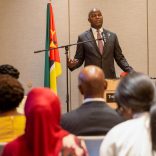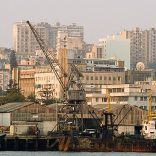Mozambique: Chapo addresses religious leaders - Watch
A growing Turkish presence in Mozambique

The East African state will host Turkish President Recep T. Erdogan next week while on official trip in the Sub-Saharan continent.
Turkish interest in Sub-Saharan Africa is gaining traction. Next week, Turkish President Recep Tayyip Erdogan will make a two-day official visit to Mozambique. Accompanied by an important delegation comprising about 200 persons, including more than 100 entrepreneurs from the private sector, the 12th president of the transatlantic Eurasian state will highlight his country’s eagerness to be part of Mozambican growth story.
Turkish interest towards Africa was first globally evidenced in 1998 when Turkey adopted the Action Plan for Africa. It received the observer status in 2005 before being accepted as a strategic partner of the African Union and a non-regional member of the African Development Bank. Since then, bilateral and multilateral conferences and summits focusing on Africa have multiplied.
Trade volumes between Turkey and Africa went from roughly USD 5.5 billion in 2003 to close to USD 18 billion today. “Trade volumes between Turkey and Mozambique have grown even faster, rising from only USD 5 million in 2003 to more than USD 120 million currently”, says Turkish Ambassador Zeynep Kiziltan, in Maputo.
The opening of the Turkish Embassy in 2011 has had a major impact on the relations between the two countries, making Turkey one of Mozambique’s main strategic business partners. “One of the priorities of next week state visit will consist in completing the legal framework that will further shape cooperation between our two countries”, explains the diplomat.
Major agreements will be signed covering mainly economic cooperation as well as the promotion of trade and protection of investments. The 18th largest economy in terms of GPD can indeed boast about its renowned expertise in the construction, energy, tourism and agriculture sectors; namely, those that display the highest growth potential in Mozambique.
“Construction mandates granted to Turkish companies in Mozambique are currently valued at about USD 300 million”, according to Zeynep Kiziltan. “Of which more than 90% were realized during the last five years”, she says in an interview with Club of Mozambique last Wednesday; adding that more than 300 Mozambicans are now employed by Turkish companies.
It will be remembered that in 2015, the year Turkish Deputy Minister of Economy visited Mozambique, the first Business Forum on the construction sector was held in the capital Maputo, attended by 15 prominent Turkish companies and followed by the signing of an agreement establishing the Turkish-Mozambican Business Council.
Zeynep Kiziltan, though, also puts great emphasis on the cultural aspects of the relation between the two countries. A subject which will also be discussed between the two partners next week. “It is essential that both nations learn to know each other”, she insists, while announcing the launch of several Turkish cultural events in Maputo this year. On the education side, Turkey also awards about 15 scholarships to young Mozambicans each year.
“About 90-100 of them are currently studying in Turkish universities, in the fields of engineering, journalism and economics, to name a few”, explains the Turkish Ambassador. Through the Turkish Cooperation and Development Agency (TİKA), assistance will also continue to be extended to Mozambican education institutions and programs.
For Zeynep Kiziltan, it is important that Turkey participates in the growth of Mozambique from a very early stage. According to the World Bank, Mozambique is expected to grow at only 3.6% in 2016, with “significant downside risks”. However, despite unfavorable prospects in the short term, Mozambique should be able to recover at a projected rate of 6.9% by 2018, thanks to two gas mega projects in the Rovuma basin. The World Bank adds that foreign direct investment will eventually support Mozambique’s external position.
For its part, Turkey’s economic performances have been impressive over the last 16 years. Its per capita income has tripled in less than a decade, now reaching about USD 9.000. Its GDP stands currently at more than USD 720 billion.
By: Levi-Sergio Mutemba












Leave a Reply
Be the First to Comment!
You must be logged in to post a comment.
You must be logged in to post a comment.